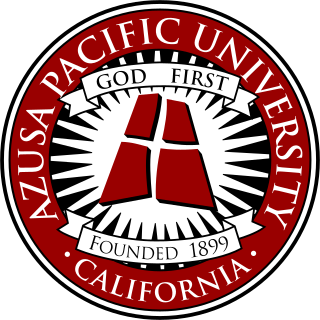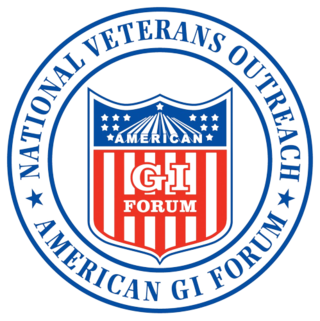
The G.I. Bill, formally known as the Servicemen's Readjustment Act of 1944, was a law that provided a range of benefits for some of the returning World War II veterans. The original G.I. Bill expired in 1956, but the term "G.I. Bill" is still used to refer to programs created to assist American military veterans.

A veteran is a person who has significant experience and expertise in an occupation or field.

Azusa Pacific University (APU) is a private evangelical research university in Azusa, California. The university was founded in 1899, with classes opening on March 3, 1900, in Whittier, California, and began offering degrees in 1939. The university's seminary, the Graduate School of Theology, holds to a Wesleyan-Arminian doctrinal theology. APU offers more than 100 associate, bachelor's, master's, and doctoral programs on campus, online, and at seven regional locations across Southern California.
The University of Arizona Global Campus is a public online university affiliated with the University of Arizona. The university announced a deal to acquire Ashford University in 2020 and completed the deal in 2023.

La Unidad Latina, Lambda Upsilon Lambda Fraternity, Inc. is a Latino-based collegiate fraternity. It was founded at Cornell University in Ithaca, New York on February 19, 1982, and has 75 active undergraduate chapters and fifteen graduate alumni professional chapters in universities and cities across the United States.

American Public University System (APUS) is a private, for-profit, online university system with its headquarters in Charles Town, West Virginia. It is composed of American Military University (AMU) and American Public University (APU). APUS is wholly owned by American Public Education, Inc., a publicly traded private-sector corporation. APUS maintains corporate and academic offices in Charles Town, West Virginia. APUS offers associates, bachelors, masters, and doctoral degrees, in addition to dual degrees, certificate programs and learning tracks.

The American GI Forum (AGIF) is a congressionally chartered Hispanic veterans and civil rights organization founded in 1948. Its motto is "Education is Our Freedom and Freedom should be Everybody's Business". AGIF operates chapters throughout the United States, with a focus on veterans' issues, education, and civil rights. Its two largest national programs are the San Antonio-based Veterans Outreach Program, and the Dallas-based Service, Employment, Redevelopment-Jobs for Progress, Inc. (SER). The current National Commander is David Rodriguez.

Trident University International is a private for-profit online university based in Chandler, Arizona. It is a member of the American InterContinental University System and accredited by the Higher Learning Commission. It is owned by the for-profit company Perdoceo Education Corporation, publicly traded on the NASDAQ under PRDO and formerly known as Career Education Corporation (CEC).

The Disabled American Veterans (DAV) is an organization created in 1920 by World War I veterans for disabled military veterans of the United States Armed Forces that helps them and their families through various means. It was issued a federal charter by Congress in 1932. It currently has over 1 million members. As a 501(c)(4) social welfare organization, it is outside the purview of – and therefore not rated by – Charity Navigator. DAV's Employer Identification Number (EIN) is 31–0263158.

Iraq and Afghanistan Veterans of America (IAVA), is a nonprofit 501(c)(3) veterans organization founded by Paul Rieckhoff, an American writer, social entrepreneur, advocate, activist and veteran of the United States Army and the Iraq War. He served as an Army First Lieutenant and infantry rifle platoon leader in Iraq from 2003 through 2004. Rieckhoff was released from the Army National Guard in 2007.
The American Council on Education (ACE) is a nonprofit 501(c)(3) U.S. higher education association established in 1918. ACE's members are the leaders of approximately 1,700 accredited, degree-granting colleges and universities and higher education-related associations, organizations, and corporations. The organization, located in Washington, D.C., conducts public policy advocacy, research, and other initiatives related to key higher education issues and offers leadership development programs to its members and others in the higher education community.

The University of Illinois Global Campus was an early, short-lived experiment in online university education by the University of Illinois. The trustees of the university voted to phase out the project in early 2009.

Zovio, formerly Bridgepoint Education, Inc. (BPI), was a publicly held, American for-profit education services company. It is no longer in operation. It was the online program manager for one online university, the University of Arizona Global Campus, until the contract termination was announced August 1, 2022. In April 2019, the company changed its name to Zovio, moving its headquarters to Chandler, Arizona. In 2020, the company sold Ashford University to the University of Arizona. Zovio also owned Waypoint Outcomes and Fullstack Academy and traded on NASDAQ under the ticket symbol ZVO.

The Post-9/11 Veterans Educational Assistance Act of 2008 is Title V of the Supplemental Appropriations Act of 2008, Pub. L.Tooltip Public Law 110–252 (text)(PDF), H.R. 2642, an Act of Congress which became law on June 30, 2008. The act amended Part III of Title 38, United States Code to include a new Chapter 33, which expands the educational benefits for military veterans who have served since September 11, 2001. At various times the new education benefits have been referred to as the Post-9/11 GI Bill, the 21st Century G.I. Bill of Rights, or the Webb G.I. Bill, with many current references calling it simply the new G.I. Bill. President George W. Bush signed H.R. 2642 into law on June 30, 2008.

The University of North Georgia (UNG) is a public senior military college with multiple campuses in Georgia, United States. It is part of the University System of Georgia. The university was established on January 8, 2013, by a merger of North Georgia College & State University and Gainesville State College. Campus locations include Dahlonega, Oakwood, Watkinsville, Blue Ridge, and Cumming.
The American Veterans Committee was founded in 1943 as a liberal veterans organization and an alternative to groups such as the American Legion and the Veterans of Foreign Wars, which supported a conservative political and social agenda. The organization's roots were planted in 1942 when Sgt. Gilbert Harrison began to correspond with fellow servicemen concerning an organization that expanded beyond the needs of military men. In 1943, the University Religious Conference at UCLA became a meeting place for the military men who shared this desire for a veterans organization that also advocated peace and justice. One year later in 1944, Charles Bolte joined the UCLA group and the American Veterans Committee was born. The founding group included Donald Prell. The new organization immediately began to publish the AVC Bulletin to document the organization's advocacy issues.
Segs4Vets, a continuing program which began in 2005, is a grass-roots effort sustained and administered by volunteers in the United States that provide Segway PT vehicles to disabled United States military personnel. The program which made its first presentation in September 2005 to three recipients who had sustained injuries in Operation Iraqi Freedom (OIF), was conceived and implemented with the assistance of Gen. Ralph "Ed" Eberhart, USAF (Ret), President of the Armed Forces Benefits Association.

The G.I. Bill Tuition Fairness Act of 2013 is a bill that would require colleges to charge veterans the in-state tuition rates regardless of whether they meet the residency requirement. The bill also makes several other changes related to veterans benefits, such as extending the time period during which veterans are eligible for job training. The bill passed the House of Representatives on February 4, 2014 during the 113th United States Congress.
The Harry W. Colmery Veterans Educational Assistance Act of 2017, commonly known as the "Forever GI Bill", eliminated the 15-year use-it-or-lose-it constraint associated with the Post-9/11 GI Bill education benefit. The updated bill was created with the intent of improving previous versions of the bill and the Reserve Educational Assistance Program (REAP) which is now defunct. The bill, called the Harry W. Colmery Veterans Education Assistance Act of 2017, flew through both the House of Representatives and the Senate in the span of three weeks, passing both by unanimous votes. After the Senate's vote, the bill was signed into law by President Donald Trump.
DOD Tuition Assistance is a US Department of Defense (DOD) program that fund higher education programming for US military servicemembers who wish to attend college before their service obligation ends. Currently, DOD TA funds servicemember's college tuition and fees, not to exceed $250 per semester credit hour or $166 per quarter credit hour and not to exceed $4,500 per fiscal year, Oct. 1 through Sept. 30. In 2019, DOD spent more than $492 million on the program that year and about 220,000 troops used the benefits.












